I am fond of saying that I have as much love and admiration for Mandela as any non-South African could. But my record of political activism and published commentaries (dating back decades) bears this out.
This is why I am so seized with contempt for those who appear to have acquired more love and admiration for him in death than I could ever possibly have had for him in life.
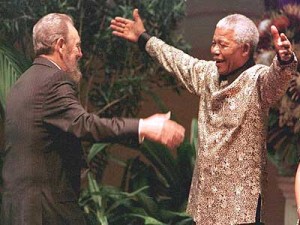 The problem with this unqualified and unquestioning hero worship we are witnessing is that it risks whitewashing Mandela’s legacy in popular consciousness. This was brought into stark relief yesterday when I heard a putatively well-educated person express incredulous indignation at a video clip of Mandela warmly embracing Fidel Castro.
The problem with this unqualified and unquestioning hero worship we are witnessing is that it risks whitewashing Mandela’s legacy in popular consciousness. This was brought into stark relief yesterday when I heard a putatively well-educated person express incredulous indignation at a video clip of Mandela warmly embracing Fidel Castro.
She clearly had no clue that Western leaders once condemned Mandela and his African National Congress (ANC) the way they condemned Castro and his revolutionary Communist Party.
The ANC is a typical terrorist organization… Anyone who thinks it is going to run the government in South Africa is living in cloud-cuckoo land.
This, according to the July 9, 1996 edition of The Independent, was how British Prime Minister Margaret Thatcher ridiculed Mandela as a way of voicing her unabashed support for South Africa’s racist Apartheid regime.
What’s more, I suspect there are many others among the newly converted who would be just as bewildered by images of Mandela embracing Castro more warmly than he has ever embraced any American president.
But such images serve as enduring testaments to the fact that Castro and others in the communist/non-aligned world were hailing Mandela as the freedom fighter he always was long before it became fashionable for leaders in America and England to do so.
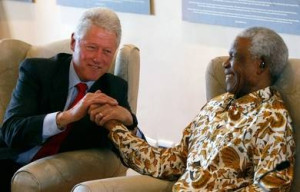 For example, based on all of the pictures former President Bill Clinton has been tweeting of himself and Mandela, you’d think Mandela actually bought into the Clintonian folklore about them having a father-son relationship.
For example, based on all of the pictures former President Bill Clinton has been tweeting of himself and Mandela, you’d think Mandela actually bought into the Clintonian folklore about them having a father-son relationship.
Except that those pictures betray:
Clinton’s work to undermine the economic foundation of the nascent Mandela-led South African republic…
After Mandela became president of South Africa in 1994, then-President Clinton pressured the nation to adopt trade policies that benefitted U.S. corporations while restricting South African access to drugs treating HIV and AIDS.
(Huffington Post, December 6, 2013)
I have often argued that the least Clinton could do to amend for this after leaving the White House was to use his Clinton Global Initiative to get big pharmaceutical companies to make antiretroviral drugs cheaper and more accessible throughout all of Africa. And even then I have always felt constrained to cite facts from my June 20, 2005 commentary “President George W. Bush Has Done More for Africa than Any Other President,” noting in particular that – through his President’s Emergency Plan for AIDS Relief (PEPFAR) initiative – the United States has funded over $46 billion in HIV/AIDS programs since 2003.
But how genuinely could we expect a humanitarian like Mandela to embrace a politician like Clinton – who willfully denied life-saving drugs to millions of Africans, when it was politically expedient to do so, even if Clinton is now helping to make those drugs available … to enhance his political legacy?
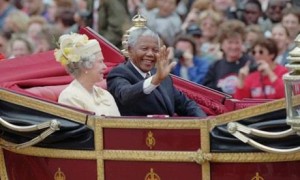 Therefore, as you see the most powerful people in the world falling all over themselves to sing Mandela’s praises in the coming days, bear in mind that the people Mandela himself loved and admired most (outside of family members) are old comrades – most of whom you will never see on TV or social media.
Therefore, as you see the most powerful people in the world falling all over themselves to sing Mandela’s praises in the coming days, bear in mind that the people Mandela himself loved and admired most (outside of family members) are old comrades – most of whom you will never see on TV or social media.
Indeed it spoke volumes about Mandela’s character that he always reserved greater affection and appreciation for comrades like Castro – who stood with him during his struggle to free South Africa, than for politicians like Clinton – who rushed to his side to bask in his post-Apartheid reflected glow.
That said, I honestly don’t know what to make of the most powerful (White) people on earth hailing this (Black) man as the most revered and influential figure of the twentieth century. Everyone from Jomo Kenyatta to Winston Churchill and Franklin Delano Roosevelt must be rolling over in his grave.
A developing meme in this respect is that Mandela was a combination of George Washington, Abraham Lincoln, and Mahatma Gandhi, which only makes me wonder about their unwitting discrimination against the more apt inclusion of Martin Luther King Jr.
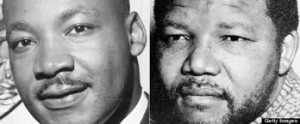 Let me hasten to clarify: Mandela deserves every praise hailed in his name and every monument erected in his honor for prevailing upon Whites in South Africa to relinquish power. It’s just that MLK deserves even greater praise and more monuments for prevailing upon Whites in America to fully recognize Black civil rights.
Let me hasten to clarify: Mandela deserves every praise hailed in his name and every monument erected in his honor for prevailing upon Whites in South Africa to relinquish power. It’s just that MLK deserves even greater praise and more monuments for prevailing upon Whites in America to fully recognize Black civil rights.
After all, in the early 1990s, Whites in a beleaguered South Africa, on the poorest continent in the world, faced the existential choice of either relinquishing power peacefully or facing a race war the likes of which the world had never seen. Moreover, even if they had used their superior armaments to kill millions of Blacks and overcome the rest, White South Africans still faced an existential threat from U.S.-led economic sanctions that would have rendered them even poorer and more isolated than North Koreans are today.
By contrast, in the late 1960s, Whites in a superpower America, on the richest continent in the world, never faced this existential choice. And even if Blacks had rioted in every city in America, they would have done more to harm themselves than pose any threat to White power. To be sure, the Soviet Union tried to exploit the Civil Rights Movement to advance its Cold War agenda against the United States. But nobody ever thought for a moment that the Soviet Union would (or could) do anything to threaten White authority in the United States, let alone pose an existential threat.
This is why it took MLK’s divine art of moral suasion to overcome far greater odds than Mandela faced.
Unsurprisingly, MLK published more inspiring words about the universal struggle for freedom during the 11 days he spent in Birmingham jail than Mandela published during the 27 years he spent in Robben Island prison. And don’t get me started on who delivered the more inspiring speeches.
What’s more, as much as we admire Mandela for spending all of those years in prison for his cause, and then forgiving his jailers; surely we must admire MLK more for dying for his, and then forgiving his assassin:
We must develop and maintain the capacity to forgive… It is also necessary to realize that the forgiving act must always be initiated by the person who has been wronged, the victim of some great hurt, the recipient of some tortuous injustice, the absorber of some terrible act of oppression.
(“Loving Your Enemies,” King Center Archives, November 17, 1957)
Anyway, the point is that, given the inferiority complex Whites tried to systematically impose on Blacks throughout much of the twentieth century, I hope the irony inherent in Whites deifying Mandela is not lost on you.
 But if we must deify any Black political leader, I still think it should be Frederick Douglass. I delineated some of the reasons why in “Mall At Last! Mall At Last! Thank God Almighty, a Black Is on the Mall At Last!” (November 14, 2006):
But if we must deify any Black political leader, I still think it should be Frederick Douglass. I delineated some of the reasons why in “Mall At Last! Mall At Last! Thank God Almighty, a Black Is on the Mall At Last!” (November 14, 2006):
- Douglass was born in slavery; MLK was born in freedom.
- Douglass spent his formative years on a plantation scrapping with his master’s dogs for food to eat; MLK spent his in relative luxury dining with America’s Black elite.
- Douglass effectively taught himself to read and write; MLK was educated at America’s best schools, including Morehouse College and Boston University.
- Douglass escaped from slavery, settled in the North, and began his political activism by personally challenging Jim Crow segregation laws that were as strictly enforced in the Antebellum North as they were in the Deep South; MLK graduated from university, settled in the South, and began his political activism by accepting the call to lead Blacks who had already begun the now-seminal Montgomery Bus Boycott.
- Douglass was the undisputed Black leader agitating for the abolition of slavery; MLK was challenged by Malcolm X and Stokeley Carmichael – whose message of self-defense and Black nationalism resonated more with Black youths (for whom ‘by any means necessary’ was more liberating and empowering than ‘I have a dream’).
- Douglass left no trail of marital infidelities in his wake that could compromise judgement of the content of his character; MLK did, so much so that, in my resigned attempt to defend his character, I was constrained to title my commentary “Martin Luther King Jr Was Also a Womanizer, So What?”, January 4, 2006.
- Douglass, who died aged 77, lived long enough not only to see his dream of the abolition of slavery fulfilled, but also to become a professional man (as a U.S. Marshall and recorder of deeds), an international statesman (as U.S. Ambassador to Santo Domingo and Haiti), and a political champion for yet another cause (Women’s Rights); MLK, who died aged 39, saw his dream of racial equality deferred so long that he did not live long enough to see it fulfilled to any significant degree.
- Douglass’s published essential writings and speeches on the fight for freedom from slavery are far more voluminous than MLK’s on the struggle for Black civil rights (see articles from one of Douglass’s many newspapers North Star, as well as his autobiographies Narrative of the Life of Frederick Douglass, an American Slave and Life and Times of Frederic Douglass. And eyewitness accounts by the likes of notorious abolitionist William Lloyd Garrison suggest that Douglass was every bit the orator MLK was. Indeed, it’s arguable that his “What to the slave is the 4th of July?” speech, which he delivered on July 5, 1852, was even more provocative and inspiring than MLK’s ‘I Have A Dream’ speech, which he delivered on August 28, 1963.
But I digress.
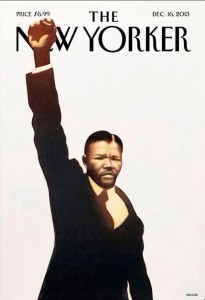 To his credit, Mandela himself will probably be rolling over in his grave if the deification of him now underway continues. Not least because I heard him say in his own words, in a BBC documentary narrated by David Dimbleby yesterday, that from the time his comrades first elected him head of the ANC, while they were all still in prison, he worried about people treating him like a “demigod.”
To his credit, Mandela himself will probably be rolling over in his grave if the deification of him now underway continues. Not least because I heard him say in his own words, in a BBC documentary narrated by David Dimbleby yesterday, that from the time his comrades first elected him head of the ANC, while they were all still in prison, he worried about people treating him like a “demigod.”
So mind your hosannas people, and know that Mandela was not God.
Amandla!
NOTE: I am sensible enough to appreciate that this global zeitgeist of Mandela worship is such that virtually nobody will be interested in reading anything not related to him. And, as indicated above, I prefer to limit my public grieving to my published commentaries supporting the causes he lived (and, admittedly, was willing to die) for.
Therefore, as I am loath to contribute to this funereal frenzy (oxymoron intended), this will stand as my last commentary until it all comes to an end with Mandela’s burial on December 15.
Related commentaries:
Mall at last…
Mandela is dead